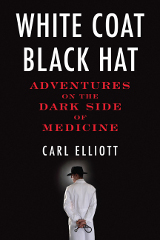The Ethicator on the Ethicist: My Answers to Last Week’s NYT Column
 Dear readers, I cannot begin to thank you for your ongoing campaign to nominate me as the next writer of the New York Times Magazine’s “The Ethicist†column. It is humbling and overwhelming to think that I have touched so many lives. I have not yet made up my mind on this matter, but just as a gesture of extra goodwill toward the Times, I thought I’d provide the writers to last week’s May 10 Ethicist Column with my own, alternative responses. If you like what I write here, please feel free to mention it to the editorial staff at the Times.
Dear readers, I cannot begin to thank you for your ongoing campaign to nominate me as the next writer of the New York Times Magazine’s “The Ethicist†column. It is humbling and overwhelming to think that I have touched so many lives. I have not yet made up my mind on this matter, but just as a gesture of extra goodwill toward the Times, I thought I’d provide the writers to last week’s May 10 Ethicist Column with my own, alternative responses. If you like what I write here, please feel free to mention it to the editorial staff at the Times.
A NY Times Magazine reader writes:
At my office, we were feeling a nagging concern about a candidate we were strongly considering for a position. So we decided to call someone at a company the person had listed on the résumé but had not provided a reference for. Wow, did we get earful on the person (not in a good way)! But then we weren’t sure if it was ethical to use this information in assessing the person. Of course, it was awfully hard to forget. We ultimately didn’t hire the person.
– NAME WITHHELD, OAKLAND
The Ethicator responds:
Dear Oakland: I fully understand the need to vet an employee thoroughly. And who can trust references? They all lie anyway. The more they want to get rid of an employee, the better the reference they’ll provide. But still, you shouldn’t limit yourself to asking other employers. They can lie, too. You need to start probing all your prospective employees’ friends and distant acquaintances. Thanks to social media, you can do this easily and under cover of anonymity. An example: A while back, while I was vetting an employee, I got suspicious of his references, so I just set up a fake twitter account, posted his name and address to twitter and the comments section of several newspapers, and asked if anybody knew him. Sure enough, my fears were confirmed. “Fuck that guy! He’s a racist and a child molester!” said one. “Dumb fuck”, said another. So just to confirm we were talking about the same person, I sent out his address and social security number, and what do you know, I heard even worse things. Total douche, apparently. Which goes to show: You can never be too careful.
Another reader writes:
We are planning a trip to Orlando to take my son to Disney World for Memorial Day weekend. Everything was booked, and then the Trayvon Martin case happened. We are quite angry . . . . Are we obligated to cancel our trip? Our son very much wants to go, but even if we lose a lot of money, I feel that ethically we shouldn’t be spending our tourist dollars in Florida.
– NAME WITHHELD
The Ethicator responds:
You are reluctant to spend your money where you believe evil is taking place; I totally get that. I’ve felt the same way from time to time. For example, a short time ago I took my kids to the Mall of America. The Mall is in Minnesota, a state which, as you are aware, continues to devote a portion of its budget to evil, plagiarizing pharmascolds. I kept thinking to myself: Is it not immoral for me to spend my tourist dollars in this state? I solved the issue by going anyway, but refusing to spend any money, sleeping outside and foraging food from the local dumpsters. My kids considered it the most miserable experience of their lives. They have flatly refused ever to go again, and have told all their friends how much they hate Minnesota. Problem solved. Do the same, and you can fulfil your son’s wishes while teaching him a powerful moral lesson
My mom and I argue whenever we head to the mall or go grocery shopping. I think it’s fine to duck into Sephora and try on some makeup, even though it is out of my price range. Similarly, it’s fine to grab a free sample at Trader Joe’s or a food store, even if I have no intention of buying it. My mom happily takes free samples, but won’t try on makeup with me. Is there a difference? Is either ethical?
– NAME WITHHELD
The Ethicator responds:
You should not feel guilty at all. There is absolutely nothing wrong with making free samples a part of your everyday routine. I do this all the time at liquor stores, in particular, where free samples can make for a pretty entertaining evening out if you’re willing to hop from store to store. Also, pharmacies can be great for free samples, especially if you know how to get behind the counter when the pharmacist is not looking. I try the samples, then I get to write about them and tell other people. Win-win.
